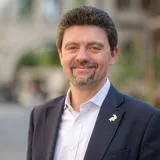Twins, especially identical twins, are very similar in appearance, but as they get older and live separately outward appearances naturally start to change. This study gives us an opportunity to look into the inner-workings of the body and notice changes in the different organ systems too. Combining this new imaging data with over 30 years of biological data donated by the twins will create a comprehensive resource to study ageing of different parts of the body, leading, we hope, to more personalised approaches to keep people well as they age.
Professor Claire Steves Professor of Ageing and Health, Head of Department of Twin Research & Genetic Epidemiology
10 October 2024
Twins MRI study celebrates 250 scans in first year
The Department of Twin Research and BMEIS has marked their first year of research collaboration using multi-organ MR imaging in twins for ageing research.

King's researchers have successfully completed the first year of a joint MR imaging project between the Department of Twin Research and the School of Biomedical Engineering & Imaging Sciences (BMEIS) that uses data from twins as part of a long-term study into health and ageing resilience.
As twins reach adulthood and live separate lives, differences in health, appearance, and more begin to appear.
The TwinsUK study has now been running for over 30 years and is designed to follow and track changes in both identical and non-identical twins over time to study how different factors such as genetics, lifestyle, and environment can be attributable to individual health over time.
BMEIS scientists have provided whole-body, multi-organ MRI scanning to over 250 twin volunteers so far. These scans will be used to build a resource database of linked images.
Researchers will use this database to look for markers of organ ageing and early onset of disease. They will also study how these markers relate to factors such as organ size, structure, and function. This will allow them to extract useful data from repeated twin scans, link it with the existing TwinsUK data, and build bigger datasets for cross-disciplinary research on ageing.
Researchers from many different departments met to discuss research ideas to mark the year anniversary, working collaboratively across disciplines to build the best scientific projects to understand whole body ageing.
Congratulations to the teams for reaching the significant milestone of 250 scans across our MRI fleet in the project's first year. This achievement highlights the value of interdisciplinary research and clinical collaboration between different Schools at King’s, benefiting patient care. The data collected will provide crucial insights into natural ageing and early disease detection in ageing populations.
Professor Sebastien Ourselin FREng FMedSci, Professor of Healthcare Engineering, Head of School at the School of Biomedical Engineering & Imaging Sciences
The MR Imaging project is possible thanks to volunteer twins who have often participated in TwinsUK for many years.
During a visit each twin will receive two scans, with each scan lasting 45 minutes. The first is on a standard 3T scanner for their brain, where they wear a head coil. The second is on the School's new low-field new scanner called the MAGNETOM Free.Max.
This first-of-its-kind MRI features an 80cm bore, the entry space for patients, which provides a more comfortable scanning experience for claustrophobic and bariatric patients, increasing the likelihood of participation in studies.
Augmented with AI, the system supports the automation of routine examinations – reducing cognitive load for researchers and opening new possibilities for radiographers faced with increasing time pressures.
Based at King’s St Thomas’ campus, the TwinsUK cohort was established by Professor Tim Spector in 1992. It now has data on more than 16,000 identical and non-identical twins, making TwinsUK the UK’s largest adult twin registry and one of the most clinically detailed in the world.
This research project has been made possible thanks to a multimillion pound grant from the Chronic Disease Research Foundation.


